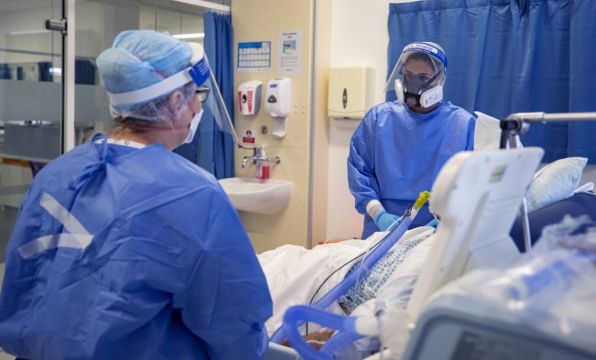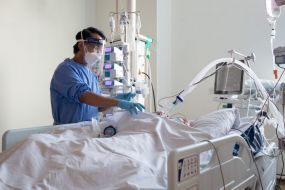Patients hospitalised with Covid-19 could avoid invasive ventilation and free up space in intensive care with one method of oxygen delivery, a Queen's University Belfast study has found.
As the Irish Examiner reports, the landmark research conducted with the University of Warwick compared three common respiratory intervention techniques to find which method works best for Covid-19 patients.
It found that oxygen and positive pressure delivered via a tightly fitting mask (CPAP) attached to patients resulted in fewer people requiring invasive mechanical ventilation from Covid-19-a potential relief for intensive care services.
More oxygen might be made available in hospitals as a result of the study as well, as researchers found no benefit from high flow nasal oxygenation (HFNO) over standard oxygen therapy for Covid patient outcomes.
HFNO requires large amounts of oxygen and is delivered up the nose of a patient.
The three methods examined: CPAP, HFNO, and standard oxygen therapy are commonly used to treat Covid-19 patients before they are moved onto invasive ventilation in a critical care bed.
Until now, it was not known which resulted in better outcomes for patients.
Hospital resources
Speaking about the research, professor Danny McAuley, chief investigator and professor and consultant in Intensive Care Medicine at the Royal Victoria Hospital and Queen's University, said the pandemic has placed a huge strain on hospital resources.
"Over the Covid pandemic, we've seen a large number of patients requiring high levels of oxygen and admission to ICU for invasive ventilation, causing a huge strain on staff and beds," he said.
"The results of this trial are really encouraging as they have shown that by using CPAP, invasive ventilation may not be needed for many patients with Covid-19 requiring high oxygen levels."
Prof McAuley said there was potential for the research to be applied everywhere and improve patient outcomes while increasing hospital resources.
Avoiding invasive ventilation is not only better for the patients, but it also has important resource implications as it frees up ICU capacity.
"This research should help healthcare professionals manage patients with Covid-19, to improve patient outcomes while helping to lessen the burden on resources,” he said.







